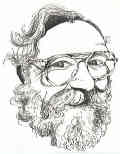No More To Caerlud
It's remarkable where you can end up by wandering through the internet. The poem was triggered by the fact that on July the 30th 1760 the last of London's city gates were sold off for scrap. The three gates in question were Aldersgate, Cripplegate and Ludgate.
Whilst it's easy to see where Cripplegate got it's name (begging for alms), and Aldersgate (where the elders entered the city) Ludgate was a bit of a mystery to me.
Lud, it transpires, was both a Celtic God (Llud Llaw Eraint) and the mythical founder of London. It was the westernmost gate to the city, thereby showing that Lud must have entered from an easterly direction, ie Wales. That most Welsh people know nothing of the "origins" of the nations Capital is surprising, particularly since the writer of this history was Geoffrey of Monmouth.
Is his account true? Probably not, but never mind.
This poem was broadcast on Roy's Rarebits on July 30 2006.
No More To Caerlud.
Lud can no more enter his city
Robbed of the gate that he used in his day:
Blagden of Coleman Street bought it completely
In 1760, and dragged it away.
He who once was God of the river,
Llud of the Silver Hand visits no more;
Denied of the gate that carried his name on’t
He simply refuses to use the back door.
The westernmost gate has gone, and defensive
Towers he built have vanished, and all
That remains of the temple that honored his triumphs
Is buried beneath the fat dome of St. Paul.
He who was God of harpers and healers,
Historians and writers, poets so proud,
Simply declines descending at Paddington,
Bothered and jostled as one of the crowd.
The people of Lud, who go on that journey,
Know not that that city once carried his name
(Caerlud, Caerlundein, then Roman Londinium)
Unknowing, they carry on shopping the same.
Lud could once more enter his city:
Tell poets and harpers to sing all he did;
Tell historians to write of his power, of his glory,
His impending return: but who would he kid?
He, the occasional King of the Otherworld,
God of war, and (collaterally) death,
Stays in another world; under his hollow hills
Llud Llaw Eraint is saving his breath.
Whilst it's easy to see where Cripplegate got it's name (begging for alms), and Aldersgate (where the elders entered the city) Ludgate was a bit of a mystery to me.
Lud, it transpires, was both a Celtic God (Llud Llaw Eraint) and the mythical founder of London. It was the westernmost gate to the city, thereby showing that Lud must have entered from an easterly direction, ie Wales. That most Welsh people know nothing of the "origins" of the nations Capital is surprising, particularly since the writer of this history was Geoffrey of Monmouth.
Is his account true? Probably not, but never mind.
This poem was broadcast on Roy's Rarebits on July 30 2006.
No More To Caerlud.
Lud can no more enter his city
Robbed of the gate that he used in his day:
Blagden of Coleman Street bought it completely
In 1760, and dragged it away.
He who once was God of the river,
Llud of the Silver Hand visits no more;
Denied of the gate that carried his name on’t
He simply refuses to use the back door.
The westernmost gate has gone, and defensive
Towers he built have vanished, and all
That remains of the temple that honored his triumphs
Is buried beneath the fat dome of St. Paul.
He who was God of harpers and healers,
Historians and writers, poets so proud,
Simply declines descending at Paddington,
Bothered and jostled as one of the crowd.
The people of Lud, who go on that journey,
Know not that that city once carried his name
(Caerlud, Caerlundein, then Roman Londinium)
Unknowing, they carry on shopping the same.
Lud could once more enter his city:
Tell poets and harpers to sing all he did;
Tell historians to write of his power, of his glory,
His impending return: but who would he kid?
He, the occasional King of the Otherworld,
God of war, and (collaterally) death,
Stays in another world; under his hollow hills
Llud Llaw Eraint is saving his breath.


0 Comments:
Post a Comment
<< Home